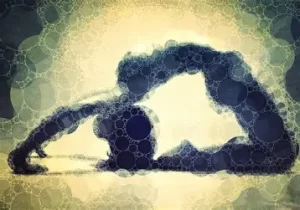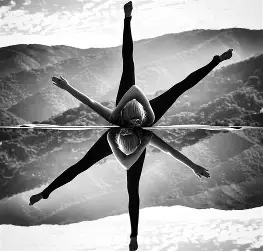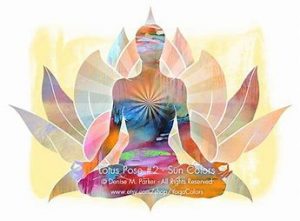My Own Journey:
 I discovered yoga at the age of 17, not out of curiosity, but out of necessity. I was struggling with health issues and searching for something that could bring relief. Already aware of the philosophy behind Hatha Yoga, I was open and willing to explore further. What began as a practical solution quickly became a lifelong path. By the age of 19, I had trained as a yoga teacher, lived in a Yoga school, and was eager to share with others what had already transformed my own life. Now, with more than 25 years of practice across many styles, I continue to turn to yoga not only as a form of exercise, but as a spiritual anchor, a mental health tool, and a way to reconnect with the wholeness of who I am.
I discovered yoga at the age of 17, not out of curiosity, but out of necessity. I was struggling with health issues and searching for something that could bring relief. Already aware of the philosophy behind Hatha Yoga, I was open and willing to explore further. What began as a practical solution quickly became a lifelong path. By the age of 19, I had trained as a yoga teacher, lived in a Yoga school, and was eager to share with others what had already transformed my own life. Now, with more than 25 years of practice across many styles, I continue to turn to yoga not only as a form of exercise, but as a spiritual anchor, a mental health tool, and a way to reconnect with the wholeness of who I am.
Yoga: Ancient Wisdom, Modern Science
For centuries, yoga has been celebrated as a holistic discipline, weaving together movement, breath, and meditation. Today, science is beginning to catch up with what yogis have always known: yoga changes us — physically, mentally, and emotionally.
A growing body of research highlights yoga’s impact on stress, anxiety, depression, and even trauma. A 2020 study in Frontiers in Psychiatry found that yoga significantly reduced symptoms of anxiety, suggesting it can be as effective as some traditional therapies. The Harvard Medical School has also reported how yoga improves heart health, lowers blood pressure, and boosts resilience to stress. For me, these studies confirm what I have personally experienced since my teenage years: yoga is not just a practice on the mat; it is medicine for life.
The Physical Benefits
Physically, yoga offers a unique combination of strength, flexibility, and balance. Unlike many fitness approaches, it doesn’t push the body aggressively but invites it into harmony. At 17, I began yoga because I needed that balance — my body was asking for healing, communicating through ailments what I already knew intellectually. Over the years, I’ve practised everything from the vigorous flows of Ashtanga and Vinyasa to the deep stillness of Yin and Restorative yoga. Each style brought something different, but together they built resilience, stamina, and a healthier relationship with my body.
Modern science supports this. Studies show yoga improves posture, reduces chronic pain (including back pain and arthritis), and even enhances immunity. For athletes, it boosts performance. For those facing illness, it offers gentle rehabilitation. For everyone, it slows down the ageing process of the body by nurturing joint health, circulation, and breath capacity.
The Mental and Emotional Benefits
But perhaps the most profound benefits of yoga are those felt in the mind and heart. When I step on my mat, I’m not just moving through poses — I am creating space to breathe, to notice, to connect. I pause in awareness, a process that, as a society, we struggle to allow and embrace.
Neuroscientific research reveals that yoga reduces cortisol (the stress hormone) and increases GABA, a neurotransmitter associated with calm and emotional regulation. MRI studies show that regular practice thickens the prefrontal cortex — the part of the brain linked with decision-making, focus, and emotional balance. For individuals living with depression, anxiety, or PTSD, yoga offers not only symptom relief but also a sense of empowerment: a way to reclaim control over body and mind.
As a transpersonal psychologist, I see yoga’s role not just in symptom management but in transformation. It invites people to move beyond the surface of life into the deeper truth of who they are — integrated beings where body, mind, and soul are not separate but united.
Yoga as a Spiritual Practice
For me, yoga has always been more than exercise. It is prayer in motion, a sacred space where I can connect with something greater than myself. Whether I practice dynamic flows or simple breathwork, I am reminded that yoga means union — with the self, with others, and with the divine. It is yet another opportunity throughout the day to worship teh Divine, offering my practice to the greater good.
Even now, decades after my first class, I practice yoga regularly as a complement to meditation and my path within Sanatana Dharma. It is both a foundation and a bridge — grounding me in the body while opening me to the infinite.
The science of yoga continues to validate what ancient teachers have taught for thousands of years: when we move, breathe, and become present, we heal. We become whole.
Yoga has been with me since I was a teenager searching for answers, and it continues to walk with me as a guide, a healer, and a friend. Whether you come to yoga for health, for peace of mind, or for spiritual growth, the practice has a way of meeting you where you are — and gently showing you the way forward.
Hari Om Tat Sat. 